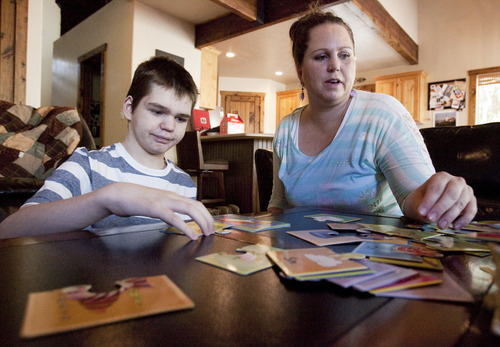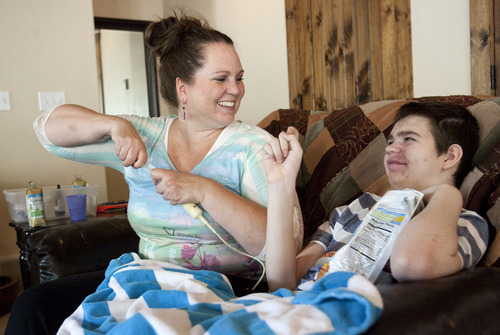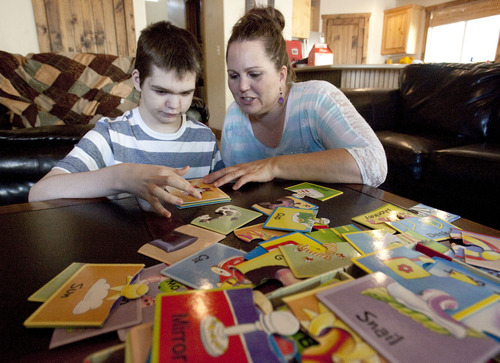This is an archived article that was published on sltrib.com in 2013, and information in the article may be outdated. It is provided only for personal research purposes and may not be reprinted.
A British pharmaceutical company has won orphan-drug status from the U.S. Food and Drug Administration (FDA) for a cannabis extract for use in children with a severe form of epilepsy called Dravet syndrome.
The drug, Epidiolex, is a liquid, purified form of cannabidiol (CBD), a non-psychoactive component of marijuana, according to its maker, GW Pharmaceuticals.
It is similar, but not identical to, whole-plant CBD extracts that some Utah parents of children with epilepsy are lobbying to import from Colorado, where medical marijuana is legal — which begs a question.
Now that a purified, pharmaceutical version is steps closer to FDA approval, is there any need to open Utah's borders to CBD supplements?
Yes, say parents.
"This changes nothing" in regard to children being able to access CBD, said Jennifer May, the Pleasant Grove mother of 11-year-old Stockton, who has Dravet syndrome.
"On the other hand," May said. "It does lend credibility to the potential of CBD as a treatment."
Dravet is characterized by the severity of seizures, sometimes hundreds a day. Like other Dravet patients, Stockton has tried dozens of pharmaceutical fixes and has run out of options.
May has watched her son deteriorate from a normally-developing toddler to a preteen who has trouble walking, can't use the toilet and, aside from the occasional chip, has to be fed from a tube.
Orphan drug designation is an acknowledgment of Epidiolex's potential for treating Dravet, a status that qualifies its maker, GW, for incentives such as tax credits and exclusive rights to the drug if approved, according to the FDA. The drug must still be FDA approved, which could take a year or more.
Under a separate process — investigational new drug programs (IND) — physicians can seek FDA permission to prescribe Epidiolex now to children with a range of seizure disorders.
To date, seven health centers have been granted IND status to treat 125 children, said GW spokesman Robert Stanislaro, noting the company is prepared to grant more.
But IND programs are time-consuming and expensive and not currently available in Utah.
"We're interested in pursuing it if GW allows it, but my understanding is they are only allowed to have a limited number of INDs and they're receiving lots of requests," said Francis M. Filloux, chief of pediatric neurology at the University of Utah. "We're looking into it."
Filloux and two faculty colleagues at the U. who treat epilepsy patients at Intermountain Healthcare's Primary Children's Hospital came out last week in support of giving Utah families access to whole-plant CBD oil. It's been shown in case studies to control drug-resistant seizures with no serious side effects.
The oil's maker, Realm of Caring Foundation in Colorado Springs, argues families should have free access to the product, which they say meets agricultural standards for hemp used in lotions and supplements sold on grocery store shelves.
"As physicians, we tend to feel more comfortable with pharmaceuticals. But I do feel comfortable with the Realm product," said Filloux. "The CBD [levels are] sufficiently high and reasonably controlled."
Filloux notes it takes years and lots of patient experience to get enough data to rule out rare side effects.
"But I tell my patients, 'Though we don't have as much information as we like, if it were my child I would try it'; the motivating factor being the condition is so severe that it is honestly life threatening, and worse, life denying," he said. "Who wouldn't want to at least give that a try unless there was clear evidence it was extremely dangerous?"
Physicians routinely prescribe unregulated substances, such as carnitine, a substance found in the body's cells, and biotin, a water-soluble B vitamin, to treat rare diseases with the same uncertainty, Filloux said.
Parents argue that while FDA controls serve an important purpose, they come at a cost.
GW says it is not "presently charging" for Epidiolex and declined to say how much the drug will cost if approved.
"Our primary motivation," Stanislaro said, "is to assist high-need children and to start to generate clinical data that may add to the scientific knowledge around the effects of CBD."
But May said families have been told to expect to pay about $10,000 to $15,000 a year for the drug.
The Realm of Caring's product, though not covered by health insurance, costs less than $200 a month.
"Although the credibility is desired," May said, "we are wary of the 'there's a drug for that' argument."
Twitter: @kirstendstewart







